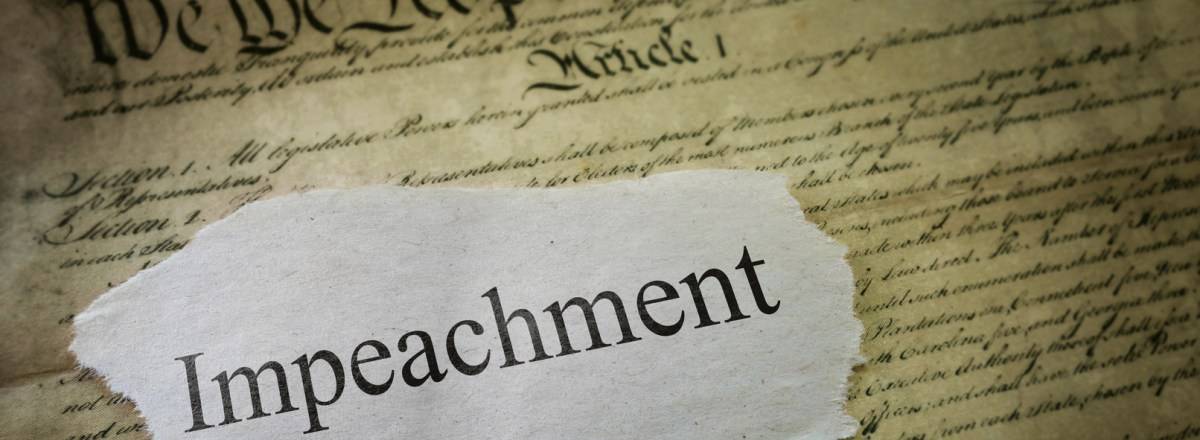Procedure of impeachment of the President
Article 61- impeachment of President of India
Impeachment has been taken a lime light since the impeachment of the president of U.S.A Donald trump. The concept of impeachment in India is adopted from the constitution of U.S.A, so what does impeachment means, what are the grounds of impeachment and how it is implemented in the context of India.
There are two kinds of Impeachment known in India and they are-
- The Impeachment of the President of India – article 61 of the Constitution of India
- The Impeachment of the supreme court judge – article 124(4) of the Constitution of India
The word impeachment as the oxford law dictionary explains is the act of charging an important public figure with serious crime or the action of calling into question the integrity or validated of something, similarly when the constitution of India talks about impeachment of the president under article 61 it refers to the act of violation of the constitution and on these core aspect the president of India is Impeached.
Article 52-62 of the constitution of India deal with the President’s elections, manner of elections, power, qualification of president, term in the office, the procedure of impeachment and re-elections.
The procedure of impeachment of President under article 61 of the constitution of India defines how can a president be impeached and the procedure to be followed for the impeachment.
Article 61 of the constitution of India states-
(1) When a President is to be impeached for violation of the Constitution, the charge shall be preferred by either House of Parliament
(2) No such charge shall be preferred unless
(a) the proposal to prefer such charge is contained in a resolution which has been moved after at least fourteen days notice in writing signed by not less than one fourth of the total number of members of the House has been given of their intention to move the resolution, and
(b) such resolution has been passed by a majority of not less than two thirds of the total membership of the House
(3) When a charge has been so preferred by either House of Parliament, the other House shall investigate the charge or cause the charge to be investigated and the President shall have the right to appear and to be represented as such investigation
(4) If as a result of the investigation a resolution is passed by a majority of not less than two thirds of the total membership of the House by which the charge was investigated or cause to be investigated, declaring that the charge preferred against the President has been sustained, such resolution shall have the effect of removing the President from his office as from the date on which the resolution is so passed.
Further in simple words we can say that,
- The process of impeachment is strenuous as well as lengthy. The President can be impeached for the violation of the constitution and either house of the parliament (Lok Sabha or Rajya Sabha) can initiate the process for impeachment.
- Once the charges are set by either house of parliament a notice is formed and signed with majority i.e. quarter of the total members of that house and then the notice is forwarded to the President and taken up for consideration after 14 days.
- The process of impeachment is a quasi-judicial, which means that there must be special majority of two-thirds members present and voting of both the houses and before this an investigation is set up by the other party.
- The president till then has a right to defend himself for the charges but if the investigating house approves with the special majority and with the originating house for the charges then the president stands impeached and the president is said to vacate the office from the date of resolution has passed.
The Supreme Court can inquire the elections of President as per the article 71(1) of the constitution of India. The Supreme Court can remove the President for either electoral misconduct or being ineligible for Lok Sabha member as mentioned in the Representation of the People Act, 1951.
The question which arises here is that does all those members of i.e. lok sabha, Rajya sabha and state legislative assemblies are included in the process of impeachment of the President of India. The answers here is that who are the in process of election are not the part in the impeachment process thus, NCT of Delhi and the Union Territory of Puducherry are not the part of impeachment procedure as they both are directly controlled by the central government. Though they both are the part in the election of the President of India
The first ever President to be impeached ever was Andrew Johnson in 1868 in U.S. Since the term Impeachment has been introduced in the Indian constitution, no President till date has been impeached in India.
The office of the President is vacant in the following cases –
- Expiry of the term i.e. 5 years
- On the death
- Resignation
- Removal by the Supreme court
- On Impeachment
Re-elections of the President of India
Under article 62 of the Constitution of India the President is to be elected to fill the vacancy in the office.
The President should be elected in the office before the expiration of the term. In which ever form the vacancy is empty whether the expiration of the term, by the reason of death or by removal, the vacancy should be filled before six month from the date of occurrence of the vacancy. The person holding the office must comply with the article 56 of the Indian constitution and must hold the office for the complete term of 5 years starting from the date he enters the office.
Author: Sweksha Beniwal,
vivekananda institute of professional studies 2nd year 4th semester in BA.LLB

